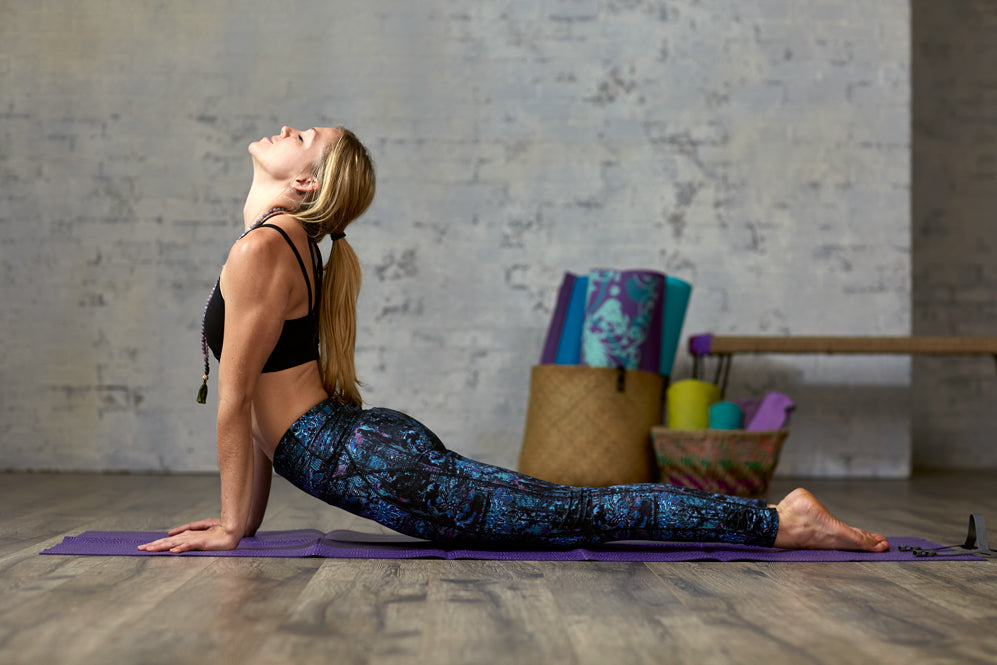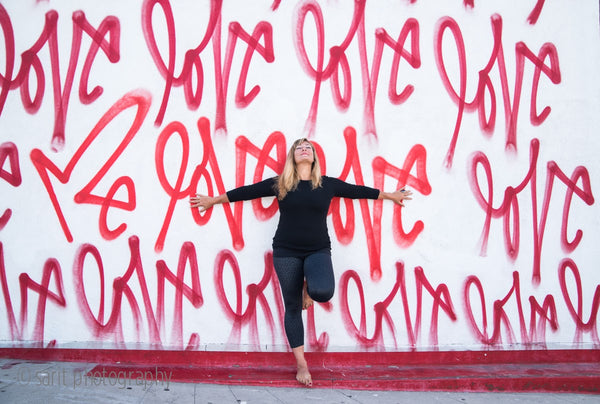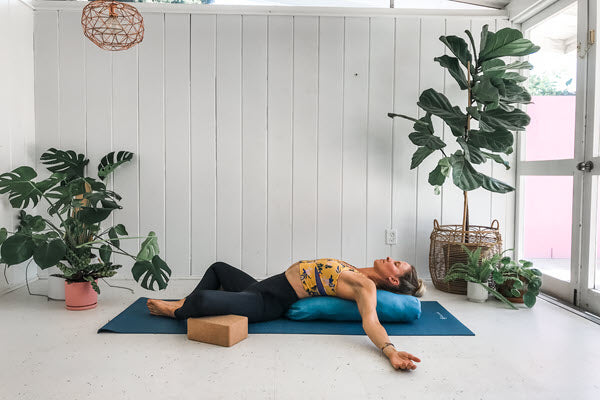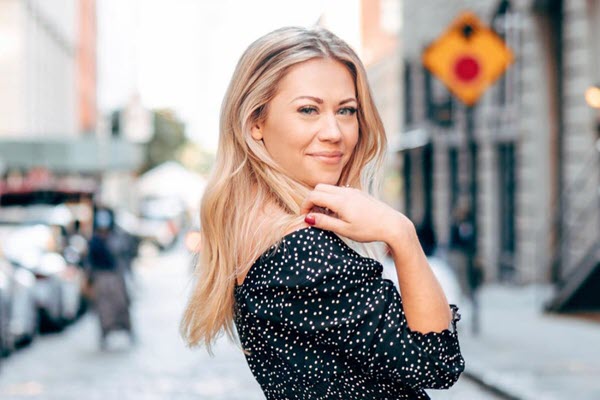How Yoga Played An Integral Part In My Eating Disorder Recovery

by: Georgina Berbari
Nailing a forearm stand never made me any happier. I remember the day I first floated into the arm balance a couple of years ago, and the feelings that accompanied my months of hard work. “Now what?” my impatient, perfectionist mind pestered (as always, unable to appreciate the stillness and quiet contentment of the present moment). "You still can’t do a handstand, Georgina,” Miss Perfectionist continued, starting to get annoyed (she always makes her opinions and dissatisfactions with me loud and clear). Did I feel strong, accomplished and empowered? Definitely. Was I proud of my body for contorting into a difficult asana? No. Not at the time. I was never satisfied and always wanted more — no goal I achieved was ever “enough”. Miss Perfection’s unrelenting voice was one of the invisible, long-lasting symptoms of my battle with anorexia.
I’m 22 years old. At 18, my eating disorder began making it a point to incessantly remind me that there are always people better than me, more talented, stronger, more this, more that. Rationally, I know I’m not alone. This often-times fatal issue affects far too many people (30 million people of all ages and genders in the U.S., to be exact). Our culture breeds a constant battle with comparison and dissatisfaction — it’s no wonder so many women feel the pressure to take up as little space as possible in order to be worthy and beautiful.
I’m smart. I knew what was happening at the time. “So why can’t you just get better?” Miss Perfection inquires, smugly. “Because it’s a mental illness and it’s not that simple,”, I retort. I say it quietly, though. She knows when I’m worn out.
Even in something as healing and wonderful as my yoga practice, my eating disorder always shows up, even though I never, ever roll out an extra mat for her or even tell her what time I’m going to class that day. But, I keep showing up too, even alongside my uninvited guest, because yoga is the only time the abusive voice in my head decides to show some form of mercy and quiet down. During practice, a role reversal ensues. Usually, I’m the one hushing my voice, being instructed to shrink down and disappear. “Be smaller, Georgina, don’t draw too much attention to yourself.” It’s not like that on my mat, though. There are the blissful moments of vacancy in the corners of my mind during yoga that I never feel anywhere else.
My journey of healing through yoga began in my dorm room, sophomore year of college, crying on the phone with my boyfriend after months of malnourishment have caught up with me. My body can’t take it any longer and I need help. I start eating again. And when I have enough strength, I go to yoga. I sign up for a studio with a student discount and I become a regular, going to class every single day. I close my eyes during sun salutations and sometimes I even cry as I allow the energy of acceptance in the dimly lit Manhattan studio hold me. The teacher learns my name. I breathe and I expand and I connect with my body in ways I haven’t in a long time. The numbness subsides, and it feels so good.
Depriving yourself of the nutrients you need to survive is an extreme act of bodily disconnect. You rebel against innate survival instincts. You wage a war against every cell in your being. You tell your body that it can no longer trust you — it isn’t safe here. Yoga, though, is safety again.
Then, the relationship with my practice becomes difficult and complex. I thought it was safe here, but anorexia and Miss Perfection turn the shielded and protective walls of the studio a bit thinner than they were before. The bullies start sneaking in halfway through my flows. I wobble and fall out of tree pose. They sense this moment of insecurity and ask me why I even bother showing up in the first place. “You’re not as good as the others,” the abusers tell me. “You’re weak. And don’t even think about ever trying to become a teacher. As if you could guide others when you’re so enormously screwed up yourself.”
I’m 22 and I’m a yoga teacher. I stand more firmly and indelibly in my eating disorder recovery as each day passes. Letting go of my destructive habit of constantly judging and belittling myself is certainly a work in progress. More days than not, I’m bombarded by my new friend: Imposter Syndrome. This is especially prevalent when students approach me after class and tell me I’ve changed their lives in a way. In meditation, I work on turning off the alarm — no one’s intruding. I continue teaching from my heart.
Nailing a forearm stand never made me happier. However, I can confidently say that what does make me feel happy, whole, and deeply content has been learning to sit still in meditation (something I was never able to do in the thralls of my disorder). I observe my feelings and thoughts, without judgment, no matter how dark and twisted they can be at times. I sit right down on my carpet alongside Miss Perfectionist and let her scream as loud as she wants in my ear, as I nod and listen. Usually, when I’ve finished my meditation and opened my eyes, she’s grown too tired to stick around and has decided to leave me alone. I like watching the calm expressions of my student’s faces in meditation too, knowing that their inner critic is probably dejectedly rolling up their unwelcome mat, shoulders slumped and leaving them be — stillness and silence is so gratifying. I love that look of contentment because I know it so well.
As I continue my meditation and journaling practice, and show up at my therapy sessions, I can tell Miss Perfectionist is getting pissed because I no longer want to play her games. She always promised me that if I listened to her, I would be the best and happiest of them all. I used to believe her, but now I’m realizing that following her lead equates to a life of running in circles, chasing a slew of goals that will ultimately never be good enough. I’m not a fan of being dizzy, and even less of a fan of being told what to do, so instead, I sit still and breathe into the spaces that hurt, and keep showing up for myself.
If you or a loved one needs help, or if you'd like additional information about the Eating Recovery Center, call 877-789-5758, email info@eatingrecoverycenter.com, or visit eatingrecoverycenter.com to speak with a Masters-level clinician.
Georgina writes about health, wellness, and fitness for Elite Daily to empower women to nurture their innate strength. When she's not writing, she teaches yoga + meditation, tries to keep her plants alive, laughs at dad jokes, and runs the Instagram page @thelittleflowerpetal.
Also in Blog

Body Peace & Personal Empowerment

Yoga for Swimmers: Poses for Strength and Mobility

